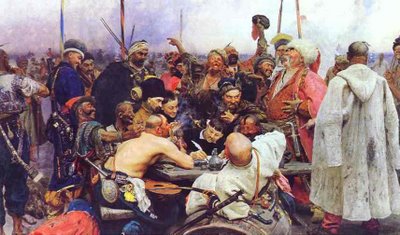
People often ask me about being Ukrainian - I often hear silly things about painting eggs and peasant shirts.
A copy of the above painting by Ilya Repin hangs in my home. While it is certainly rude and not reflective of my views, it does provide a sense of Ukraine's long-standing nationhood which even some intellectuals refuse to take seriously. In the heart of every Ukrainian is a small bit of cossack, and not a "little Russian";)
Despite its early nationhood in 988 AD, Kievan Rus', in the 17th Century, Ukraine was a constantly disputed territory between between Catholic Poland and Muslim Turkey and Orthodox Russia (just starting to emerge as a great power).
The Cossacks were Ukrainian cavalrymen who established autonomous military communities on the Turkish border. The most famous Cossack settlement was the Zaporozhian "Sich'" near present-day Zaporozh'e on the Dniepro River. At various times, different Cossack bands shifted alliances back and forth between Poland and Russia.
In 1675, Poland was forced by military losses to sign a treaty surrendering areas including Zaporozh'e to the Turks. The Cossacks themselves had plenty of fight left, however ... as the attached letter to the Turkish Sultan demonstrates, in fact makes Stephane Dion's modern day letter-writing battles with the separatists look wimpy.
The following is translated from D. I. Evarnitsky, "History of the Zaporozhian Cossacks (Vol 2)," St. Petersburg, 1895; pp. 517-518:
Original text in Russian
These [Cossack attacks] so inflamed the hatred of the Muslims toward the Zaporozhian Cossacks and the entire Christian population of Ukraine that the Turks decided to attack the Zaporozhian Sich and raze it to the ground.
There was a popular tradition that, before sending his troops to the Zaporozhian Sich, Turkish Sultan Muhammad IV sent to the Zaporozhians a letter demanding they submit voluntarily to him, an unconquerable knight. To the Sultan's letter, the Cossacks responded with free choice of words in a letter of their own. It denied the Sultan all honor, cruelly mocking his boasts of an "unconquerable knight."
Many who treasure Ukrainian lore preserve copies of this letter of the Turkish Sultan and of the quaint reply of the Zaporozhians. The letter may be fictitious, but it is entirely consistent with the spirit of the Zaporozhian Cossacks.
Sultan Mahmud IV to the Zaporozhian Cossacks:
As the Sultan; son of Muhammad; brother of the sun and moon; grandson and viceroy of God; ruler of the kingdoms of Macedonia, Babylon, Jerusalem, Upper and Lower Egypt; emperor of emperors; sovereign of sovereigns; extraordinary knight, never defeated; steadfast guardian of the tomb of Jesus Christ; trustee chosen by God himself; the hope and comfort of Muslims; confounder and great defender of Christians -- I command you, the Zaporozhian Cossacks, to submit to me voluntarily and without any resistance, and to desist from troubling me with your attacks.
--Turkish Sultan Mahmud IV
Here is a translation of the letter that the Cossacks sent to the Turkish Sultan when he asked them to surrender.
Thou Turkish Satan, brother and companion to the accursed Devil, and companion to Lucifer himself, Greetings!
What the hell kind of noble knight art thou? The Devil voids, and thy army devours. Never wilt thou be fit to have the sons of Christ under thee: thy army we fear not, and by land and on sea we will do battle against thee.
Thou scullion of Babylon, thou wheelwright of Macedonia, thou beer-brewer of Jerusalem, thou goat-flayer of Alexandria, thou swineherd of Egypt, both the Greater and the Lesser, thou sow of Armenia, thou goat of Tartary, thou hangman of Kamenetz, thou evildoer of Podoliansk, thou grandson of the Devil himself, thou great silly oaf of all the world and of the netherworld and, before our God, a blockhead, a swine's snout, a mare's ass, a butcher's cur, an unbaptized brow, May the Devil take thee! That is what the Kozaks have to say to thee, thou basest-born of runts! Unfit art thou to lord it over true Christians!
The date we write not for no calendar have we got; the moon is in the sky, the year is in a book, and the day is the same with us here as with thee over there, and thou canst kiss us thou knowest where!
May we speak again, if only for posterity. - OEC
Grain alcohol and letter-writing baby, they certainly make for an entertaining combination.
No comments:
Post a Comment